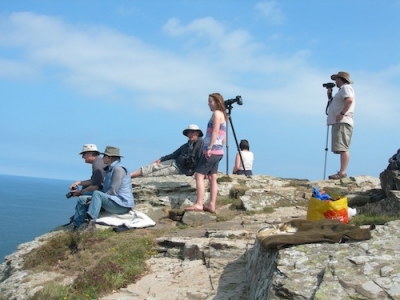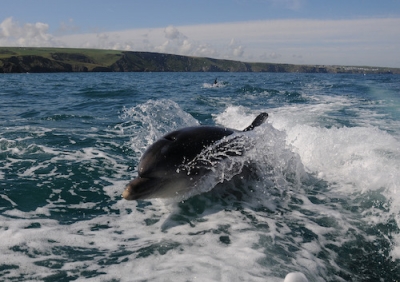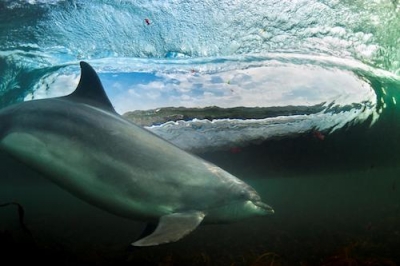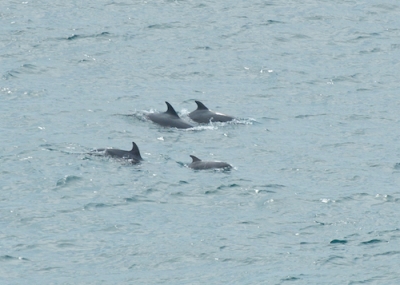Overview
Cornwall Wildlife Trust’s Seaquest Southwest Programme is taking action to conserve Cornwall’s enigmatic bottlenose dolphins by stepping up its research programme, joining forces with the Lizard Watch Point, and getting our local population on Britain’s wildlife map.

At the end of July, Cornwall Wildlife Trust’s Seaquest Southwest Project came to the Lizard. The Project had a training event booked in with local Lizard Watch Point volunteers; to learn the methodologies and skills to carry out Seaquest effort based surveys for marine megafauna such as dolphins, porpoises and whales. Expecting to only be joined by one or two keen naturalists, our Seaquest Project officer Matt Thurlow was blown away to find the room full of enthusiastic volunteers – local people keen to learn more about their surrounding environment and do their bit to record and protect it.
 Seaquest Southwest is a citizen science marine recording project run in conjunction with Devon Wildlife Trust which relies on people like those at the Lizard Watch Point to achieve its aims. For over 20 years the Project has been recording the distribution and abundance of our most charismatic marine wildlife; including dolphins, sharks, whales, porpoises, seals, sunfish and much more. The project incorporates sighting records sent in by the public with structured surveys conducted by trained volunteers, to better understand and monitor these species around the South West. Only with evidence-based records of occurrence, behaviour and ecology can we act to better protect and conserve these wonderful animals around our coasts.
Seaquest Southwest is a citizen science marine recording project run in conjunction with Devon Wildlife Trust which relies on people like those at the Lizard Watch Point to achieve its aims. For over 20 years the Project has been recording the distribution and abundance of our most charismatic marine wildlife; including dolphins, sharks, whales, porpoises, seals, sunfish and much more. The project incorporates sighting records sent in by the public with structured surveys conducted by trained volunteers, to better understand and monitor these species around the South West. Only with evidence-based records of occurrence, behaviour and ecology can we act to better protect and conserve these wonderful animals around our coasts.
 One particular animal that excites sea watchers are our inshore, southwest population of bottlenose dolphins, which has become well known throughout Cornwall, Devon and the Isles of Scilly attracting attention through acrobatic displays and playing in the waves amongst surfers. Many people do not realise how rare these animals are due to their regular use of inshore coastal waters and consequent frequent sightings, but according to the Trusts’ research via our Seaquest Southwest project, numbers sighted around our coast have halved since the 1990’s. This decline in group size is particularly worrying as we know that the animals are reproducing, yet group numbers continue to go down.
One particular animal that excites sea watchers are our inshore, southwest population of bottlenose dolphins, which has become well known throughout Cornwall, Devon and the Isles of Scilly attracting attention through acrobatic displays and playing in the waves amongst surfers. Many people do not realise how rare these animals are due to their regular use of inshore coastal waters and consequent frequent sightings, but according to the Trusts’ research via our Seaquest Southwest project, numbers sighted around our coast have halved since the 1990’s. This decline in group size is particularly worrying as we know that the animals are reproducing, yet group numbers continue to go down.
What is worrying is that our Cornish bottlenose dolphins are not currently offered any form of protection against these threats they face. This is because, incredibly, our important group of dolphins is not officially recognised as a ‘resident’ population by the UKs statutory Nature Conservation Bodies due to a lack of coordinated and validated scientific research. The good news is the Trusts 2015 Bottlenose Dolphin Appeal raised vital funds to enable further research plus a public awareness campaign that will give us the evidence we need to lobby for better protection for these special animals.

As part of our future bottlenose work, the Trust is organising the first Southwest Bottlenose Forum where experts, volunteers, and interested members of the public can share knowledge and expertise to further this work and help get bottlenose dolphin on the map. SO Save the Date! Saturday 29th October 2016. Booking is essential, so for more information and to receive an invite please contact Seaquest@cornwallwildlifetrust.org.uk or visit www.cornwallwildlifetrust.org.uk/Seaquest
Published: Aug 2016
Author: Abby Crosby, Marine Conservation Officer, Cornwall Wildlife Trust
